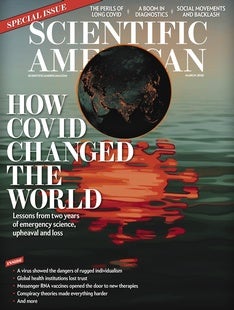COVID-19 will continue in pandemic form, surging in one or more regions and disrupting daily life, until the world reaches herd immunity. With that, most scientists say, the SARS-CoV-2 virus will become endemic—always present but transmitted among people at modest, predictable rates. After several years the infamous 1918 influenza pandemic made that transition, and the virus is still circulating, 104 years later, in mutated strains. Almost all influenza A infections since 1918 have descended from that strain.
As the endemic stage arrives, people of all ages will be eligible for the COVID vaccine, and hospitals and pharmacies will be well supplied with effective treatments for infection. At that point, it might be wise for public health officials to treat COVID as a respiratory disease that is more dangerous than a cold, similar to how we handle influenza and cytomegalovirus (CMV)—by evaluating distribution of a seasonal vaccine, tracking hospitalization rates and educating the public about current risk. We don’t yet know if COVID will lead to higher rates of long-term complications than those diseases do, so other precautions may be necessary.
In this future, routine testing might become part of everyday life. People with imperceptible symptoms who test positive would know to wear masks and isolate from others. If we could develop similar tests for influenza and CMV and make them cheaply available to everyone, everywhere, society could end up even safer against infectious respiratory diseases than it was before COVID arrived.
Even if COVID cases declined significantly, it’s unlikely the virus would burn out. As long as it was still spreading in animals, it could spill over into humans at another time. Nature is always surprising us. A future, reemergent SARS-CoV-2 could be either less or more transmissible, less or more lethal. The Omicron variant that spread this winter taught us to expect the unexpected. Our world still has much to do to become better prepared for new variants—as well as whatever novel virus emerges next.


